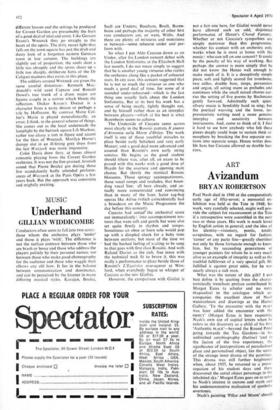MUSIC
Underhand
GILLIAN WIDDICOMBE
Conductors often seem to fall into two sexes: those whom the orchestra plays 'under' and those it plays 'with'. The difference is not the surface contrast between those who are brash or bossy and those who address the players politely by their personal names; nor between those who make good choreography for the audience and those who waggle their elbows any old how. It lies in the balance between communication and dominance, and can be perceived by the listener in many differing musical styles. Karajan, Boulez, Sze11 are Unders; Beecham, Boult, Baren- boim and perhaps the majority of other first rate conductors are, or were, Withs. And there are plenty of mixtures and mutations in between—some rehearse under and per- form with.
So when I put Aldo Ceccato down as an Under, after his London concert debut with the London Sinfonietta at the Elizabeth Hall last month, I do not mean simply to suggest that he is another young virtuoso who rattles the orchestra along like a packet of coloured stars. In any case, this concert suggested that he is not so much the virtuoso as one who needs a good deal of time, for some of. it sounded under-rehearsed—which is the last thing one usually feels about the London Sinfonietta. But at its best his work has a sense of being neatly, tightly thought out, and by himself rather than as an interplay between players—which at his best is what Barenboim seems to achieve.
The Underside of Ceccato came across most clearly in the Rossini cantata Ii pianto d'Armonia sulla Morte d'Orfeo. The work itself is one of those youthful miracles to place beside early Schubert and very early Mozart, and a good deal more advanced and assured than Rossini's own early string sonatas. He begins as the good student should (there was, after all, an exam to be passed with this work) with a good dose of Haydn for the overture and opening male chorus. But 'slowly the inimical Rossini blossoms. Those springy accompaniments, those vocal romps and roulades, that boun- ding vocal line: all here already, and ac- tually more concentrated and convincing than in many of the later, lazier rag-bag operas like Adina (which coincidentally had a broadcast on the Music Programme the day before this concert).
Ceccato had sorted* the orchestral score out immaculately : into accompaniment tex- tures that were soft and gentle but were also set quite firmly in rhythm and tempo. Sometimes an oboe or horn solo would pop up with a dimpled cheek for a baby tune between sections; but most of the time we had the hushed feeling of waiting to be sung to that goes with first class Rossini. And with Ryland Davies as the rich, free tenor with the technical neck fit to brave it, this was really a performance to place beside those of Rossini's L'Equh'ico straragante at Wex- ford, when everybody began to whisper of Ceccato as the new Giulini.
However, the comparison with Giulini is not a fair one here, for Giulini would never have allowed such an odd, disjointed performance of Henze's Choral Fantasy. Whether or not Ceccato's sympathies are simply narrower than this programme; whether his contact with an orchestra only works when he is most at home with the music: who can tell on one concert? It could be the penalty of his way of working. But perhaps the answer • is more simply that he did not know the Henze well enough to make much of it. It is a deceptively simple piece, soft and lightly scored for trombone, two cellos, double bass, timps, percussion and organ, all acting more as preludes and continuos while the small mixed chorus car- ries the setting of five poems by Bachmann gently forward. Admittedly such quiet. silvery music is fiendishly hard to sing; but the poetical weaving and the loose, im- pressionistic writing need a more genuine interplay and sensitivity between instruments. And, come to think of it, I find it hard to see how anybody who felt these pieces deeply could hope to sustain their at- mosphere by breaking the five separate sec- tions into separate songs. Henze writes dou- ble bars but Ceccato allowed us double bar- riers.


































 Previous page
Previous page